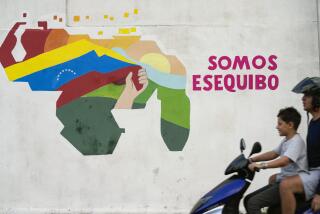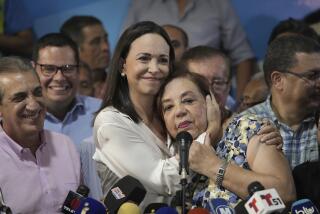Pence says U.S. will up the ante as it seeks ouster of Venezuelan President Maduro
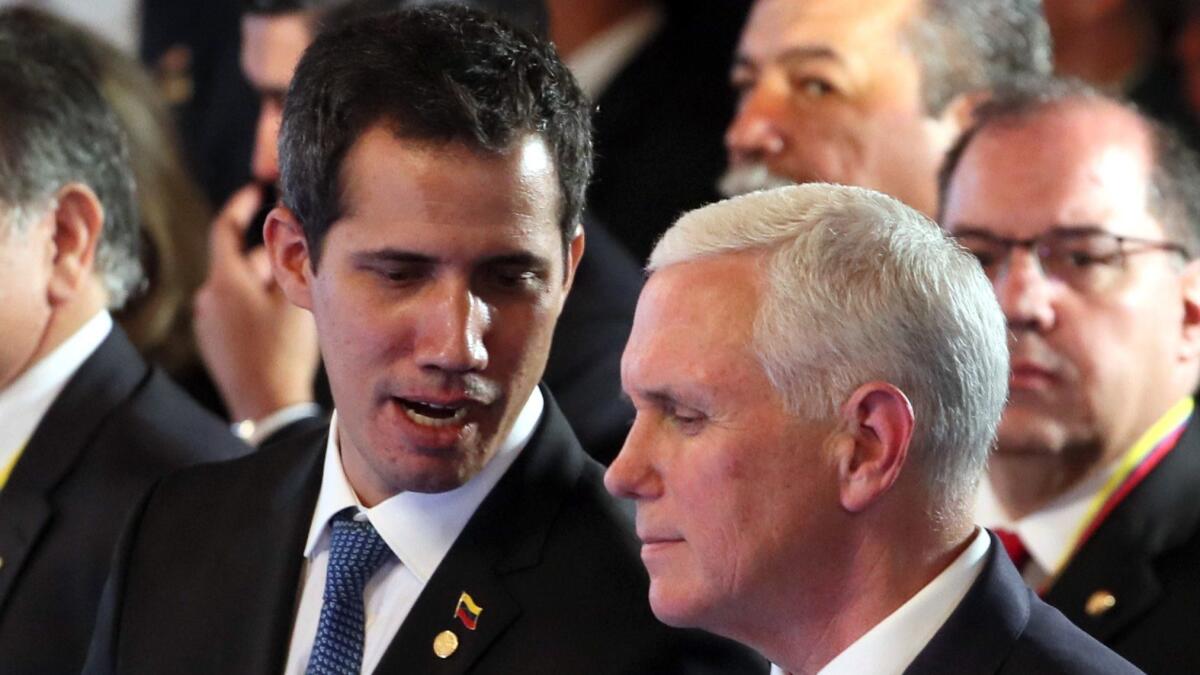
Vice President Mike Pence promised Monday that the United States would continue to to apply economic and diplomatic pressure to induce Venezuelan President Nicolas Maduro to leave his country, but did not rule out the eventual use of military force.
Pence spoke in Bogota at a meeting of the Lima Group, a forum of 14 Latin American and Caribbean countries formed in 2017 to deal with the impacts of the Venezuelan crisis, including millions of displaced migrants. A majority of members have joined the United States in demanding that Maduro resign and make way for self-declared interim President Juan Guaido and new elections.
“We hope for a peaceful resolution but as President Trump has said, all options are on the table,” Pence said. The vice president was seated next to Guaido, the Venezuelan National Assembly president who declared himself interim president on Jan. 23.
“We gather here to confirm our commitment to the freedom-loving people of Venezuela. Know that you are not alone. Stand firm,” Pence said. “The day will arrive soon when the long nightmare of Venezuela will end.”
Recognizing that Maduro’s tenure in power depends on support from the Venezuelan military, Pence urged officers and soldiers to accept Guaido’s offer of amnesty and defect to the opposition.
Although 167 members of the Venezuelan armed forces were reported to have left their posts and crossed over into Colombia over the weekend to accept Guaido as their commander in chief, the mass defection hoped for by U.S. officials so far has not occurred.
Pence arrived Monday morning in Colombia to meet with Guaido and other Latin American leaders to discuss a path forward in efforts to unseat Maduro.
The meeting comes after a weekend in which Guaido and his supporters, which include Colombia, the United States and the European Union, failed to significantly breach the Venezuelan border with tons of humanitarian aid that had been stockpiled in the Colombian border city of Cucuta. The aid was given principally by the U.S., with other countries including Canada and members of the EU pitching in.
But aid-laden trucks were stopped and burned at the border on Saturday. Clashes with Venezuelan national guard troops firing tear gas and rubber bullets claimed five lives and injured more than 300 at Colombian and Brazilian border crossings where protesters tried to enter with aid.
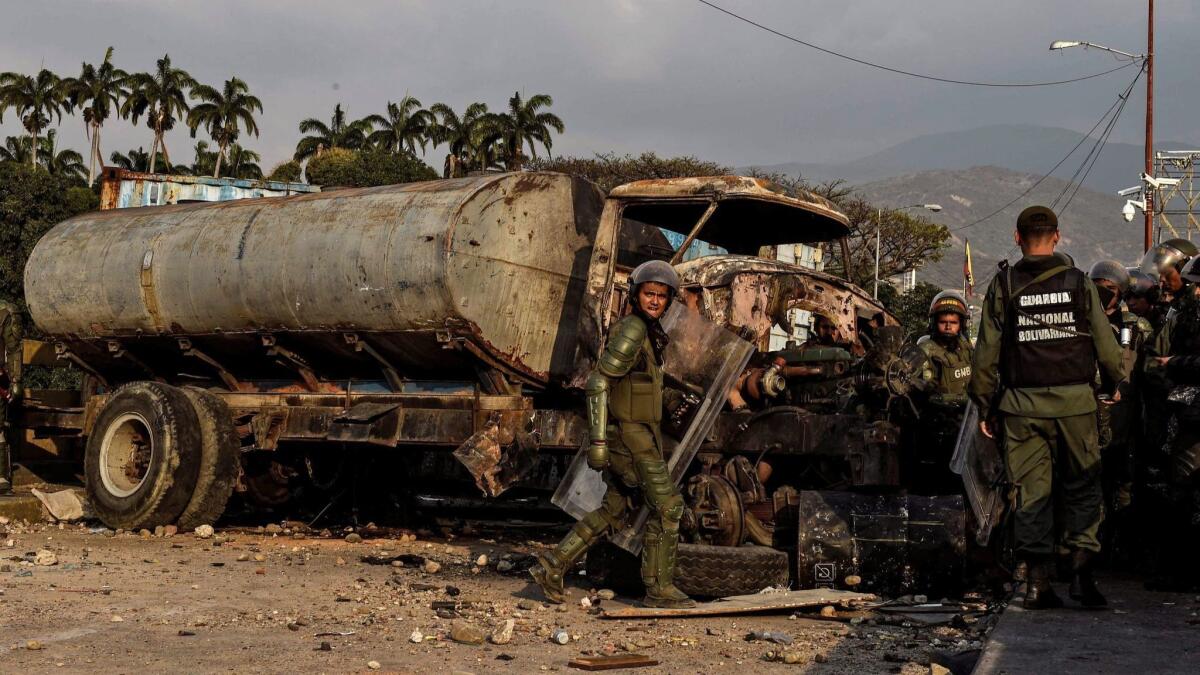
After arriving in Bogota, the capital, Pence met with Colombian President Ivan Duque and Guaido before proceeding to the Lima Group meeting. Besides Duque, those present included Guatemalan President Jimmy Morales and Panamanian President Juan Carlos Varela, both of whom support Guaido’s plan to replace Maduro.
In his speech, Pence announced that new economic sanctions would be imposed soon against the Maduro government. The U.S. has already frozen Venezuelan assets, prohibited the purchase of Venezuelan oil and given Guaido exclusive access to certain government accounts. The vice president said the United States was also providing $56 million in additional aid to Venezuelan migrants, bringing this fiscal year’s aid total to $195 million.
Further intensifying economic pressure on the Caracas government, the Trump administration on Monday added four Venezuelan governors to a growing list of sanctioned officials loyal to Maduro, a socialist who has followed the path of his predecessor, Hugo Chavez.
The governors, from the states of Zulia, Apure, Vargas and Carabobo, will be blacklisted, banned from doing business with U.S. individuals or companies and subject to the forfeit of any assets in U.S. banks.
Gov. Omar Jose Prieto Fernandez of oil-rich Zulia state is believed to have overseen drug trafficking and organized crime, the U.S. Treasury Department said. Gov. Ramon Alonso Carrizalez Rengifo of Apure, which borders Colombia, stands accused of massive repression of opposition activists.
All stood in the way of U.S. efforts to deliver humanitarian aid to Venezuelans from Colombia over the weekend, Treasury officials said.
In his speech to the Lima Group gathering, Guaido said Maduro’s “acts of barbarity were seen by the world” during Saturday’s border disturbances.
“We saw the cruelty of this dictatorship shooting at its own citizens and blocking humanitarian aid. It was a sign of a moral disaster that must be condemned by us today,” Guaido said.
Prior to Pence’s arrival, Colombia’s foreign minister, Carlos Holmes Trujillo, opened the meeting by saying that Colombia and its Latin American neighbors must ”tighten the political and diplomatic fence around Venezuela … to support the efforts of Venezuelans to reach the reestablishment of democracy and constitutional order.”
Many of the Lima Group member nations have been overwhelmed with Venezuelan immigrants; of the more than 4 million Venezuelans who have departed their native country since 1999, about 1.2 million are thought to be living in Colombia.
A nation with two presidents: How a political crisis has unfolded in Venezuela »
Morales, the Guatemalan president, told the gathering that his government “believes in liberty for Venezuela and the necessity to recover democracy…. Maduro has led his country into a unsustainable situation.” Panama’s Varela said, “International pressure should be stronger and more effective against Nicolas Maduro’s regime.”
Guaido has been recognized as interim president by 50 nations that consider Maduro’s reelection in May to a six-year term fraudulent, mainly because several potential opposition candidates were disqualified from running. Of the 14 members of the Lima Group, only Mexico and Uruguay have not recognized Guaido, and both have called for further negotiation with Maduro.
Critics contend that Maduro and his loyalist supreme court have steadily chipped away at the powers of the democratically elected and opposition-controlled National Assembly and replaced it with a new loyalist constitutional assembly.
Late Sunday, former Chilean President Michelle Bachelet, who is now the U.N. high commissioner for human rights, issued a statement in which she condemned the “violent acts” at various points along Venezuela’s border with Colombia and Brazil over the weekend.
But Morales took the opportunity before the Lima Group to criticize Bachelet and the U.N. for not providing more help to Venezuela’s neighbors groaning under the financial and social cost of hosting thousands of migrants.
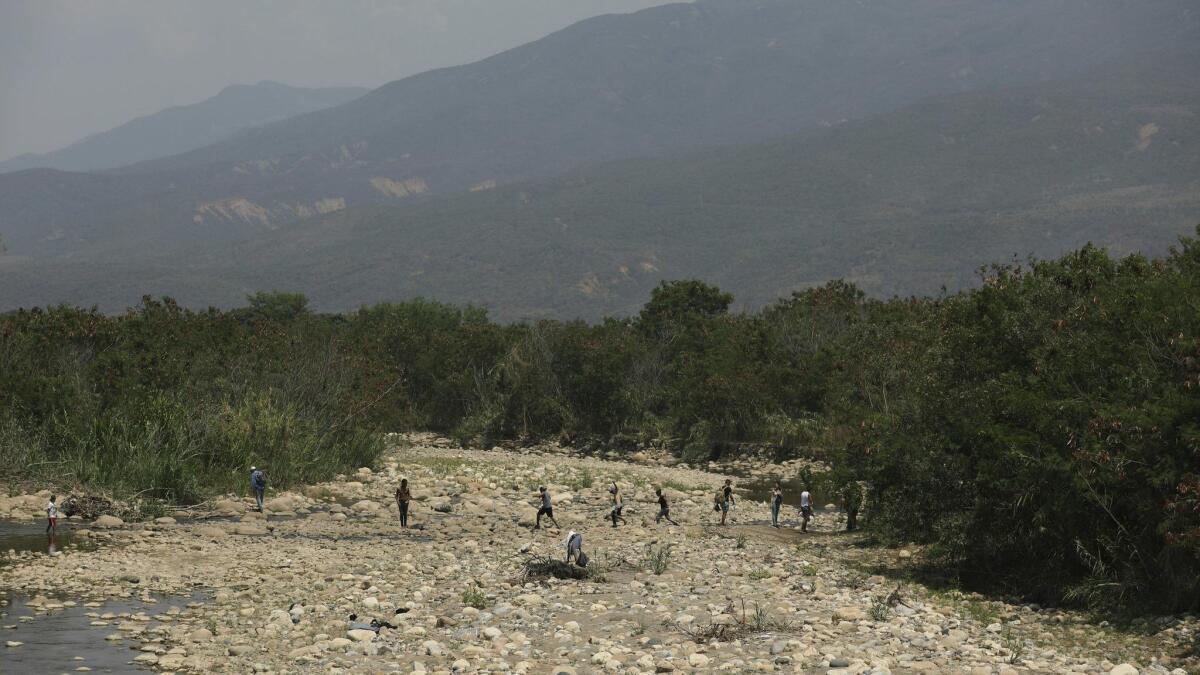
Questions remain about the future of Guaido, who crossed into Colombia last week and has remained in the neighboring country. The self-declared government of the acting president, who heads the opposition-dominated Venezuelan congress, controls no Venezuelan territory or ministries.
Guaido could face arrest if he returns to Venezuela, where he is under criminal investigation and was barred from leaving the country.
However, any prospective effort by Maduro’s government to detain Guaido would likely be seen in Washington as a major provocation. The Trump administration has warned publicly that any action by Maduro’s government against Guaido could prompt unspecified retaliation from Washington.
Special correspondent Kraul reported from Bogota and Times staff writer McDonnell from Cucuta, Colombia. Special correspondent Mery Mogollon in Caracas, Venezuela, and Times staff writer Tracy Wilkinson in Washington contributed to this report.
More to Read
Start your day right
Sign up for Essential California for news, features and recommendations from the L.A. Times and beyond in your inbox six days a week.
You may occasionally receive promotional content from the Los Angeles Times.

